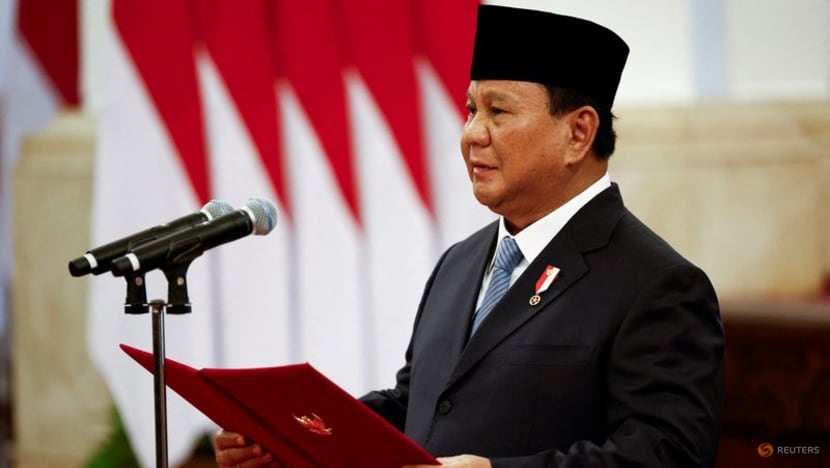Commentary: Indonesia’s VAT hike reversal has businesses and investors rattled
Indonesian President Prabowo Subianto's U-turn on increasing the value-added tax from 11 to 12 per cent undermines trust in government policy and creates an unpredictable investment environment, says this trade scholar.

CANBERRA: On Dec 31, 2024, the eve of a long-anticipated increase in Indonesia’s value-added tax (VAT) rate from 11 to 12 per cent, President Prabowo Subianto abruptly decided to revise the hike, announcing that it would apply only to luxury goods. This eleventh-hour shift has created substantial uncertainty for businesses and investors, raising questions about Indonesia’s fiscal management and economic strategy.
The decision undermines trust in the consistency of government policy. Businesses in the formal economy had spent months preparing for the VAT increase, adjusting pricing strategies and supply chains.
The sudden change introduces operational disruptions, adds to compliance burdens and makes planning more difficult. Such unpredictability erodes Indonesia’s reputation as a stable place to invest and conduct business.
The VAT hike was initially intended to boost state revenue, address a low tax-to-gross domestic product (GDP) ratio of approximately 10.5 per cent and fund critical investments in infrastructure and education.
Limiting the increase to luxury goods narrows the VAT hike’s fiscal impact. While shielding lower-income households from immediate effects, this approach fails to address broader inequities and weakens the government’s ability to meet revenue targets.
Indonesia’s shrinking middle class – which fell from 23 per cent of the population in 2018 to 17 per cent in 2023 – remains under pressure. This group is crucial in driving domestic consumption and contributing to state revenue, but erratic policy shifts are exacerbating their financial challenges and limiting their economic participation.
Essential goods, though spared from the VAT hike, remain unaffordable for many due to stagnant wages and rising living costs.
NEED FOR COHERENT POLICY
Labour-intensive industries, once key drivers of job creation, have been hit hard by rising competition and labour costs. The government’s emphasis on downstreaming strategies, which are capital-intensive and create fewer jobs, have further exacerbated the strain felt by middle-class households.
The future of labour-intensive industries remains uncertain, underscoring the need for a coherent industrial policy aligned with broader economic goals.
Indonesia’s economic growth slowed to 4.95 per cent in the third quarter of 2024, as households grappled with stagnant wages and declining public service quality. Public dissatisfaction – driven by perceptions of corruption and inefficiency – is further eroding trust in fiscal policies.
Economic theory cautions against increasing taxes during periods of economic weakness, as consumption taxes like VAT are regressive, disproportionately affecting lower-income households. Without mitigating measures, the risks of raising VAT under such conditions outweigh potential benefits.
Indonesia’s VAT rate remains regionally comparable – Thailand has a lower rate of 7 per cent, while the Philippines and Vietnam align more closely at 12 and 10 per cent respectively. Despite this, Indonesia’s tax-to-GDP ratio lags behind its peers.
Raising the VAT could help close this gap and support critical investments such as in infrastructure, which could lower logistical costs and boost connectivity, or education, which could strengthen workforce competitiveness.
But these benefits hinge on transparent and efficient revenue allocation.
Comprehensive tax reform is crucial. Broadening the tax base, improving compliance and modernising administration are key to sustainable revenue growth. Initiatives like the Bill on Harmonization of Tax Regulations and the CoreTax System aim to simplify administration and reduce compliance barriers for businesses.
But these efforts should complement VAT adjustments within a cohesive fiscal strategy. During periods of economic weakness, countercyclical fiscal measures like reducing taxes or increasing public spending to stimulate growth are beneficial.
The VAT hike could contradict this principle unless paired with measures to offset its regressive effects.
ADDRESSING SYSTEMIC FLAWS
First, targeted measures such as subsidies or direct transfers could cushion vulnerable groups and preserve household consumption. Lowering VAT registration thresholds to include more small businesses and simplifying compliance for micro, small and medium enterprises could encourage formalisation and expand the tax base.
Second, with global geopolitical shifts offering Indonesia opportunities to attract manufacturing investments, success hinges on competitive policies and a skilled workforce. Facing job losses, labour-intensive industries need targeted support to regain their footing.
Policies must incentivise investments in these sectors and align VAT reforms with broader economic goals, like driving job creation and economic recovery. Policies promoting competitiveness and leveraging global shifts can also position Indonesia as a manufacturing hub and boost employment and income levels.
Finally, transparent and equitable implementation is critical.
Public trust in fiscal policy depends on demonstrating that increased revenue benefits citizens through improved infrastructure, education and healthcare. Without addressing inefficiencies and corruption, revenue gains may not translate into tangible improvements. Expanding the tax base by targeting informal sectors and enhancing compliance can ensure fairer distribution of tax burdens.
The reversal of the VAT hike on essential goods offers temporary relief to households and businesses. But the government’s indecision and last-minute policy shift come at a cost. While avoiding an across-the-board hike should be welcomed in the current economic climate, the abrupt change undermines confidence in governance and long-term economic planning.
For Indonesia to remain competitive and attract investment, policies must be transparent, consistent and evidence-based.
Addressing systemic flaws in the tax system, supporting vulnerable groups and promoting investment in key industries are critical steps to ensuring resilience and sustainable growth.
Rania Teguh is Pacific Trade and Development Scholar at the Crawford School of Public Policy, The Australian National University. This commentary first appeared on East Asia Forum.

















